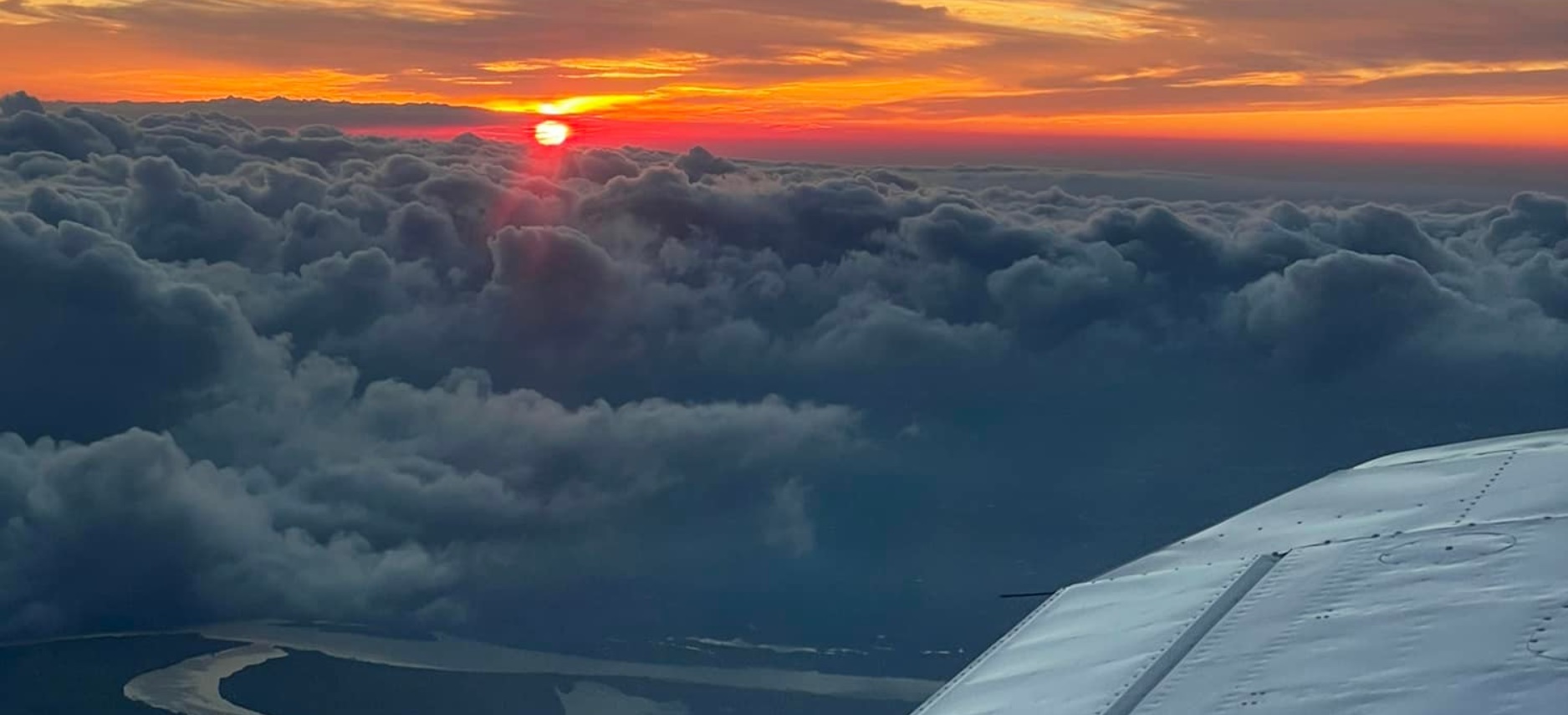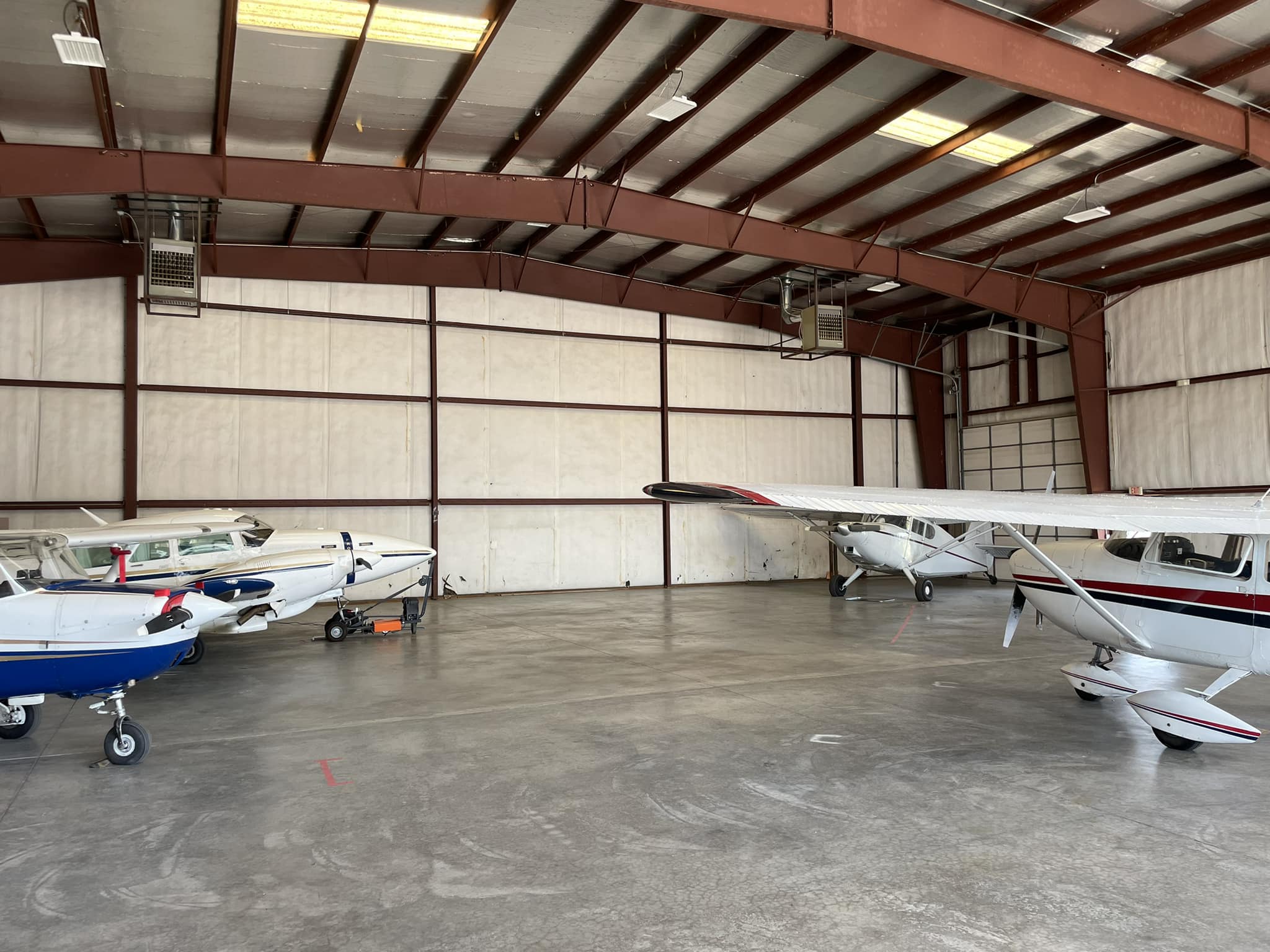Newly licensed pilots need to log hours in the air, but what happens when they lack the money or the desire to own their own plane outright? They rent planes to log training hours and develop their skills.
The Springfield Airport Board unanimously approved a lease agreement with a startup aircraft rental company at its September meeting. Guy Wiegand is a business owner set to break into the aviation industry for the first time with a new venture, Pegasus Aviation.
“I just look forward to building this opportunity,” Wiegand told the Airport Board. “I just hope to create an opportunity that I didn’t have.”
Wiegand is the owner of a SnapOn Tools franchise and Sho-Me Muscle Cars, a classic car shop in Rogersville. He is also a pilot with more than 700 hours of flight time and private instrument and multi-engine aircraft ratings.
“I’ve been in business in this area for about the last 12 years total,” Wiegand said. “Since 2000, I’ve been in business for myself.”
Wiegand hasn’t had his pilot’s license for very long, but said he spends about 250 hours per year in the air. He simply loves to fly.
Wiegand estimates the official launch date for the business will be at the end of September or in early October, as soon as his business license from the city of Springfield is approved.
Recent graduates in need of flight hours
Wiegand saw a need that the caretakers of the Springfield-Branson National Airport knew about for some time. The airport has a contract with Premier Flight Center and with Ozarks Technical Community College for the operation of a flight school, but new pilots don’t have many options when it comes to renting aircraft and logging the hours necessary to advance their training.
The Federal Aviation Administration requires pilots to have at least 250 hours of flight time, with some added specifications, in order to apply for a commercial license. To work for a commercial airline as a pilot, the requirement is 1,500 hours.
The Springfield airport will soon have an aircraft rental business on site, which will help new commercial pilots put hours in the bank after they finish flight school. If they don’t want to commit to buying an aircraft, they can still log flight hours, or “burn holes in the sky,” as Wiegand says, in rented airplanes.
“It’s really a business area that we’ve desired at the airport for several years,” Springfield Director of Aviation Brian Weiler said.
Requirements to keep up licenses

(Photo provided by Guy Wiegand)
Hobby flyers might also want to rent airplanes, especially if they don’t fly often enough to justify the expense of aircraft ownership, insurance, maintenance and hangar rental.
“You’ve got certain requirements you have to continue to meet through the FAA in order to stay proficient, you know, legal to fly under the FAA,” Wiegand said.
Depending on the pilot’s desires, proficiency may require a certain number of takeoffs and landings at night, or a certain number of takeoffs and landings every six months in order to legally fly with passengers.
Some pilots simply want to take trips to nearby airports for pleasure outings, or to eat what Wiegand calls “the $100 hamburger” at a restaurant in another city.
“There’s all kinds of these FAA rules to stay compliant, to stay proficient that you have to overcome before you just take your family to fly down to Rogers, [Arkansas] and buy yourself a hamburger,” Wiegand said.
Starting with small planes
Clients of Pegasus Aviation will pay what’s called a “wet rate” rental fee, which includes the cost of fuel for their flights. The rental fees will depend on the size of the plane they rent and the amount of time they intend to spend in the air.
“One of the things we don’t have is a place for people to rent aircraft here after that, so (Wiegand) is looking to fulfill that goal,” Weiler said. “Pilots will enjoy low-cost rental service. Not only can they build time, stay compliant, stay proficient and work toward their aviation goals, but they can also fly recreationally.”
The business will start with three small planes, two Cessna 172 Skyhawks and one Cessna 150 aircraft. According to the manufacturer, the Cessna 172 is a single piston engine plane with four seats, and is “the most popular single-engine aircraft ever built.” It is rated for slow landing speeds.
In flight, the Cessna 172 has a maximum cruising speed of 124 knots, equal to about 142.7 miles per hour on the ground.
According to the Aircraft Owners and Pilots Association, the Cessna 150 is a small, two-seat airplane promoted as “the world’s premier trainer.” The AOPA estimates more than 250,000 pilots have learned to fly in Cessna 150s.
Wiegand would like to build the business as it goes to grow its fleet by adding more aircraft and upgrading to more modern planes over time.
Historic hangar space

Weiler said that because the business proposal stands to benefit the airport by providing a previously unavailable service, the airport staff proposed some measures to help get the deal done.
“We are proposing to do a few things to help (Wiegand), mainly leasing him the former [John Q.] Hammons Hangar, which we received back after that estate was settled,” Weiler said.
After developer and businessman John Q. Hammons died in 2013, the Springfield-Branson National Airport leased what had been his hangar to Ozarks Technical Community College for storage of some of its aircraft. OTC has since moved its planes into the same space its flight school occupies.
“Hangar storage remains in strong demand at this airport and a lot of airports, so trust me, we could rent this hangar five times over to many entities, but the goal is to kind of use it as an incubator to try to grow businesses from that that will help and benefit the airport,” Weiler said.
However, the deal between the airport and Pegasus Aviation is only for a one-year lease, with two mutually-agreeable extension options.
“Both of us have to agree to extend that beyond the first year,” Weiler said. “Another way of saying that is that’s kind of on a short leash.”
Pegasus Aviation will initially rent the hangar from the airport for $1,500 per month for the first year, with higher rates going up to $2,000 per month by the third year.
Flight school celebrates growth
Premier Fight Center opened six years ago at the Springfield-Branson National Airport. Its goal, along with its partner, Ozarks Technical Community College (OTC), was to help meet a growing demand for new pilots.
“We opened in 2016 with just two training aircraft. Now we have nine,” said Corina Bond, manager of Premier Flight Center. “They were stored in several different locations at the airport — we needed to get all of them under one roof.”
Premier partners with Ozarks Technical Community College to offer a course that equips graduates with a commercial pilot’s license and an associate’s degree upon completion.
Premier is one of just five accredited Part 141 flight schools in Missouri. Part 141 certification indicates that the school’s training and curriculum are certified by the Federal Aviation Administration. During its first semester, working in conjunction with OTC, there were 24 students. Today there are approximately 80.
“The impact of this flight training program goes far beyond Springfield,” Bond said. “The pilots graduating from our program meet a great need. They will make their mark not only on the local economy, but the national and world economy as well.”
Students logged 692 flight hours of training in the month of August, a record for the school.

